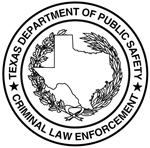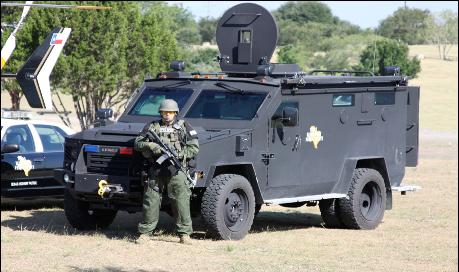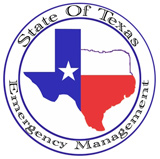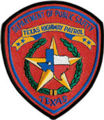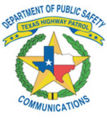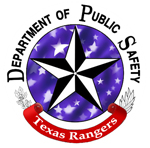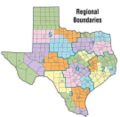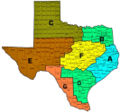Department of Public Safety (TX)
From The RadioReference Wiki
Contents
Texas Department of Public Safety
The Texas Department of Public Safety (otherwise known as DPS), is a state law enforcement agency responsible for "enforcing laws, administering regulatory programs, managing records, educating the public, and managing emergencies, both directly and through interaction with other agencies."
Texas DPS is divided into 6 Regions, with multiple Communications Centers for each region. The regional headquarters are in:
- Dallas (Reg. 1)
- Houston (Reg. 2)
- Weslaco (Reg. 3)
- El Paso (Reg. 4)
- Lubbock (Reg. 5)
- San Antonio (Reg. 6)
- State Capitol (Rgn. 7)
- Austin (State Headquarters)
According to a press release dated 10/21/2010, the DPS will close communications centers in Sherman, Texas City, Beaumont, Ozona, San Angelo, Childress and Harlingen.
Within the past few years DPS has migrated all of its radio systems to a conventional P25 digital protocol, which is capable of linking any Comm Center in the state to any other by VoIP, essentially giving any trooper the ability to talk to any other, statewide. DPS also has networked 5 facilities into the Harris County Regional Radio System (Texas SCIP p. 28) and two facilities into the City of Austin/Travis County Regional Radio System (Texas SCIP p. 28).
The SCIP has stated, on page 28, that DPS "will migrate toward a statewide hybrid trunked radio system utilizing 700MHz where feasible," accessible by all state agencies. The THP Strategic Outlook from the DPS website, also shows that this is the current plan, on page 44.
DPS uses linked repeaters and base stations at many Comm Centers. When dispatchers
transmit, they may be broadcasting over many linked sites at once, while the
trooper is only being broadcasted on their local site. This limits a receiver to hear
only the dispatch side of conversations at times. DPS also uses half-duplex on their
base stations at times. In this case, the trooper will broadcast on a "Mobile to
Base" frequency, while dispatch listens on this frequency. To respond dispatch
transmits on a "Base to Mobile" frequency, while the trooper listens on that same
frequency. This may also cause a receiver to only hear the dispatch side, since
usually the dispatcher is broadcasting from a tall tower, relative to the trooper
broadcasting from ground level. Reports have indicated that in the future more
Base outputs will be rebroadcasting the "Mobile to Base" side of the conversation
which has been noted on San Antonio's Base B1 recently. See below for a "working"
list of linked sites.
On 1 November 2018, DPS began using a new alphanumeric unit numbering system.
Divisions
The Department of Public Safety is comprised of 8 Divisions:
- Administration
- Criminal Law Enforcement
- Director's Staff
- Texas Division of Emergency Management
- Driver License
- Public Safety Commission
- Texas Highway Patrol
- Commercial Vehicle Enforcement
- Communications
- Texas Rangers
Criminal Law Enforcement
The CLE division consists of 1,239 personnel, including 625 commissioned officers and 614 support personnel.CLE is split into 5 units:
- Criminal Intelligence Service
- Motor Vehicle Theft Service
- Narcotics Service
- Bureau of Information Analysis
- Crime Laboratory Service
The CLE Chief also oversees the DPS SWAT team which is comprised of 20 commissioned officers from all DPS services.
Texas Division of Emergency Management
The Division of Emergency Management is the statewide commssion responsible for disaster preparedness. They report directly to the Governor of the State of Texas. They are the state agency responsible for coordinating the Radio Amateur Civil Emergency Service (RACES) and homeland security preparedness drills.
The DEM has split the state into disaster districts and sub-districts. That map is available here.
Texas Highway Patrol
Otherwise known as "troopers" or "THP," the Highway Patrol is the most visible division of DPS, tasked with enforcing traffic laws on Texas highways.
Commercial Vehicle Enforcement (CVE)
The CVE Unit of THP is the enforcement unit of commercial vehicle traffic, ensuring all weight/size regulations are followed, ensuring compliance with the Motor Carrier Safety Act. They also ensure hazardous material placarding regulations are followed, as well as commercial vehicle registration enforcement. There are 41 CVE Offices throughout the state, including 2 at El Paso's Bridge of the America's POE and the Ysleta POE.
Communications and DPS Unit Numbers
There are 32 Communications facilities throughout the state as well as one mobile unit, the Communications Emergency Operations Team, which is supported by Command One, a 30 ft. mobile communications trailer. See the linked press release above, for a list of Comm Centers that will be closing, reducing the number down to 22.
Texas DPS Unit Numbers
Highway Patrol Units begin with the region number, then the letter denoting the district, then 3 or 4 numbers after that.
For example, 2A604 would be a Highway Patrol unit from Region 2 (Houston) District A (Houston), then the remaining numbers denote the individual unit. Units that end in 00 (for example 2A600) appear to be sergeants.
Three digit numbers appear to be lieutenants, captains, majors.
DPS Aircraft are three digit numbers beginning with 1, the last number denotes the region. For example, 102 and 112 are helicopters based in Region 2, Houston.
Detectives, (CID and Rangers), are identified by a four digit number beginning with an 8. The second number denotes the region, and the third and fourth numbers identify the individual unit. For example, 8738 would be a detective (probably CID) working out of region 7-Capitol Police
Four digit numbers beginning with a 9 are communications technicians (for example 9162).
Texas Rangers
The Rangers are famed as the oldest law enforcement agency in the country with statewide jurisdiction. Currently, there are 144 commissioned officers, by state congressional act, and they are split into 7 troops "A-G."
- Recently there have been signs that the Rangers are reorganizing and downsizing to 6 troops.
Maps
- Texas Highway Patrol & Commercial Vehicle Enforcement districts (.pdf)
- Texas Rangers company areas (.jpg)
- TXDPS.zip - Contains a Google Earth .kml map of Texas Dept. of Public Safety communications sites.
Click on the desired image to enlarge
Ten Codes
| Code | Description | Code | Description |
|---|---|---|---|
| 10-1 | Signal Weak | 10-42 | Ending Tour Of Duty |
| 10-2 | Signal Good | 10-43 | Request Criminal History |
| 10-3 | Stop Transmitting | 10-44 | Permitted to Carry a Handgun |
| 10-4 | Affirmative (OK) | 10-45 | Operating Authority |
| 10-5 | Relay To _____ | 10-46 | Motorist Assist |
| 10-6 | Busy | 10-47 | Abandoned Vehicle |
| 10-7 | Out Of Service | 10-48 | Road Hazard |
| 10-8 | In Service | 10-49 | Impoundment List |
| 10-9 | Say Again (Repeat) | 10-50 | Traffic Accident (Specify Type) |
| 10-10 | Negative | 10-51 | Wrecker |
| 10-11 | _____ On Duty | 10-52 | Ambulance |
| 10-12 | Stand By (Stop) | 10-54 | Livestock in roadway |
| 10-13 | Existing Conditions-Road/Weather | 10-55 | Intoxicated Motorist |
| 10-14 | Message / Information | 10-56 | Intoxicated Pedestrian |
| 10-15 | Message Delivered | 10-59 | Escort |
| 10-16 | Reply To Message | 10-60 | Unit in Vicinity |
| 10-17 | En Route (To) | 10-66 | Reserved |
| 10-18 | Urgent | 10-70 | Assisting Unit |
| 10-19 | (In) Contact | 10-71 | Officer Needs Assistance |
| 10-20 | Location | 10-72 | Check Welfare/Safety Of Officer (Unit) _____ At ______ Location |
| 10-21 | Call _____ By Phone | 10-73 | Advise Status / OK? |
| 10-22 | Disregard | 10-74 | Road Block |
| 10-23 | Arrived At Scene | 10-75 | Deployment of Stinger Spikes |
| 10-24 | Assignment Completed | 10-77 | Registered Sex Offender |
| 10-25 | Report To (Meet) | 10-79 | Request Justice of Peace/Coroner |
| 10-26 | Estimated Time Of Arrival | 10-80 | In Pursuit |
| 10-27 | License / Permit Information | 10-81 | Breathalyzer Assistance Needed |
| 10-28 | Ownership Information | 10-85 | Building/Office Access Requested |
| 10-29 | Records Check (Wanted) | 10-86 | Officer/Operator On Duty |
| 10-30 | Danger / Caution | 10-89 | Bomb Threat |
| 10-31 | Pick Up | 10-90 | Alarm-Fire/Security (Specify) |
| 10-32 | Man with a gun | 10-91 | Prisoner Transfer |
| 10-33 | Help (Emergency) | 10-92 | Suspicious Activity |
| 10-34 | Correct Time | 10-93 | Disturbance |
| 10-35 | Crime in Progress | 10-94 | Secure Radio for Confidential Traffic |
| 10-36 | Reserved | 10-95 | Prisoner/Subject In Custody |
| 10-37 | Reserved | 10-96 | Mental Subject |
| 10-38 | Vehicle (Traffic) Stop | 10-97 | Known Offender |
| 10-39 | Permit/Oversize/Overwidth Check | 10-98 | Criminal History Indicated |
| 10-40 | Subject Detained, Expedite | 10-99 | Wanted/Stolen Indicated |
| 10-41 | Beginning Tour Of Duty |
Unidentified/Unconfirmed Frequencies
The following are not listed in the database. If you can confirm any of them please submit the information and remove them from this list.
Frequency/Input Type Tone/NAC - Description 155.4450 M 162 NAC - Mobile 1? (talkaround) 155.4600 M 162 NAC - Mobile 2? (talkaround) 159.2175 M 162 NAC - Mobile 3? (talkaround) 156.2100 M ? - CVE? (had 162.2 PL before digital) 158.9100 M ? - CLE? (had 162.2 PL before digital) 154.9125 M ? - unknown use 154.9575 M ? - unknown use 158.9175 M ? - unknown use 159.0750 M 162 NAC - CLE Tactical? 159.2100/154.6650 RM 162 NAC - Repeater A? 159.2175/154.6725 RM 162 NAC - Repeater B? 155.5125/154.8450 RM ? NAC - Angleton rpt (Brazoria Co.) (Frequency changed 07/2016. Was 155.6850/154.8450) 155.5125/154.9275? RM ? NAC - Ballinger repeater (Runnels County) 159.2175/154.6725 RM ? NAC - Coleman repeater (Coleman County) 155.4600/154.6800 RM ? NAC - Texas City repeater (Galveston County) 159.2175/154.6725 RM ? NAC - Alpine/Elephant Mtn repeater (Brewster County)
The following are listed on the 700MHz Texas Final Showing attachment (Jan, 2020) for 700 MHz State License WPTZ776.
769.21875 DPS Austin Capitol 769.45625 DPS Austin Capitol 769.68125 DPS Austin Capitol 769.91875 DPS Austin Capitol 770.40625 DPS Austin Capitol 769.21875 DPS Border Ops Reserved - Statewide 769.65625 DPS Border Ops Reserved - Statewide 769.71875 DPS Border Ops Reserved - Statewide 769.96875 DPS Border Ops Reserved - Statewide 770.21875 DPS Border Ops Reserved - Statewide 770.71875 DPS Border Ops Reserved - Statewide 769.18125 DPS SWAT (Maintenance) Statewide 774.81875 DPS SWAT (Maintenance) Statewide
Statewide FCC Licenses
HF Temporary Base, Mobile
VHF Temporary Base, Temporary Repeater, Mobile
VHF LoJack
UHF Surveillance Robot
700 MHz State License
4.9 GHz Temporary Fixed, Mobile
Microwave Temporary Mobile
Interoperability
Old Channel Plans
Low Band
- The VHF low band system was used from 1950 to the late 1970s.
- It is not known if all radios had 42.84 and 42.88 or what they were used for. Please correct this if you know.
- In some areas 154.6650, 156.2100, 159.1500, 159.0900 and 159.2100 were used for point-to-point links to 42.9000/42.7400 remote sites.
| Frequency | Input | Type | Tone | Channel | Description | Mode |
|---|---|---|---|---|---|---|
| 42.9000 | 42.7400 | BM | CSQ | CH A | Dispatch | FM |
| 42.9000 | M | CSQ | CH B | Talkaround | FM | |
| 42.8400 | BM | CH C? | Unknown use | FM | ||
| 42.8800 | M | CH D? | Unknown use | FM |
High Band
- Around 1975 to 1978 the DPS switched to VHF high band. This is the original channel plan.
- In some areas 154.6650, 156.2100, 159.1500, 159.0900 and 159.2100 were used for point-to-point links to 155.4600/154.6800 remote sites.
| Frequency | Input | Type | Tone | Channel | Description | Mode |
|---|---|---|---|---|---|---|
| 155.4600 | 154.6800 | BM | 162.2 PL | CH 1 | Primary A dispatch | FM |
| 155.4600 | M | 162.2 PL | CH 2 | Talkaround | FM | |
| 154.9500 | M | CSQ | CH 3 | Intercity mobile | FM | |
| 155.3700 | 154.9500 | BM | CSQ | CH 4 | Intercity base | FM |
| 155.5050 | M | 162.2 PL | CH 5 | CLE talkaround | FM | |
| 155.5050 | 154.9200 | RM | 162.2 PL | CH 6 | CLE repeater | FM |
| 155.4450 | M | 162.2 PL | CH 7 | Talkaround | FM | |
| 155.4450 | 154.6950 | BM | 162.2 PL | CH 8 | Primary B dispatch | FM |
- In the late 1980s-1990s the original 8 channel GE mobile radios were replaced. The new radios had channel capacity for more DPS repeater channels (below) and local county channels.
- Some additional DPS repeaters numbered 20-32 were used in certain areas.
| Frequency | Input | Type | Tone | Channel | Description | Mode |
|---|---|---|---|---|---|---|
| 159.2100 | M | 162.2 PL | CH 9 | Talkaround | FM | |
| 159.2100 | 154.6650 | RM | 162.2 PL | CH 10 | Repeater 10 | FM |
| 159.2100 | 154.6650 | RM | 107.2 PL | CH 11 | Repeater 11 | FM |
| 159.2100 | 154.6650 | RM | 110.9 PL | CH 12 | Repeater 12 | FM |
| 159.2100 | 154.6650 | RM | 118.8 PL | CH 13 | Repeater 13 | FM |
| 159.2100 | 154.6650 | RM | 123.0 PL | CH 14 | Repeater 14 | FM |
| 159.2100 | 154.6650 | RM | 127.3 PL | CH 15 | Repeater 15 | FM |
| 159.2100 | 154.6650 | RM | 136.5 PL | CH 16 | Repeater 16 | FM |
| 159.2100 | 154.6650 | RM | 141.3 PL | CH 17 | Repeater 17 | FM |
| 159.2100 | 154.6650 | RM | 146.2 PL | CH 18 | Repeater 18 | FM |
| 159.2100 | 154.6650 | RM | 151.4 PL | CH 19 | Repeater 19 | FM |
Linked Sites
- Notice that these links are subject to change (reducing or expanding the number) at any time, and is handled at the Communication Center.
Region 1
| Communications Center | Site | Location |
|---|---|---|
| Sulphur Springs | Base B | Sulphur Springs |
| Rptr 10 | Greenville | |
| Rptr 19 | Paris | |
| Texarkana | Base C | Texarkana |
| Rptr 14 | Marshall | |
| Tyler | Base A | Tyler |
| Rptr 01 | Canton | |
| Mineral Wells | Base A | Whitt (main) |
| Base A | Mineral Wells (backup - seldom used) | |
| Rptr 13 | Aledo | |
| Rptr 16 | Glen Rose | |
| Rptr 20 | Decatur |
Region 2
| Communications Center | Site | Location |
|---|---|---|
| Conroe | Base C | Conroe |
| Rptr 18 | Huntsville | |
| Houston | Base B | Houston |
| Rptr 01 | Huffman | |
| Texas City | Rptr 20 | Texas City |
| Rptr 19 | Santa Fe |
Region 5
| Communications Center | Site | Location |
|---|---|---|
| Wichita Falls | Base B | Wichita Falls (backup) |
| Base B | Windthorst (main) | |
| Rptr 09 | Throckmorton | |
| Rptr 03 | Tolbert (Vernon) |
Region 6
| Communications Center | Site | Location |
|---|---|---|
| San Antonio | Base C | San Antonio |
| Rptr 13 | D'Hanis | |
| Base A | Kerrville | |
| Rptr 20 | New Braunfels | |
| Rptr 15 | Stonewall |
Related Links
Return to DB page: Texas Department of Public Safety (DPS)
Return to Wiki Page: Texas (US)
